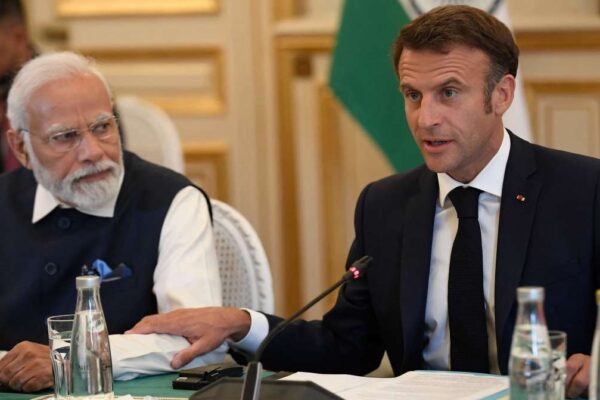By Pradeep Global Foundation
Climate change has emerged as one of the most pressing global challenges of our time. The recent G20 summit, held in India, brought together world leaders to discuss critical issues, including climate change and the transition to renewable energy sources. In this article, we explore the urgency of climate action, the outcomes of the summit, and the role of international cooperation in addressing this existential threat to our planet.

Climate Change: A Global Crisis
Climate change, driven primarily by human activities such as burning fossil fuels, deforestation, and industrial processes, poses a grave threat to the environment and the well-being of future generations. The consequences of climate change are already evident, with rising global temperatures, more frequent and severe extreme weather events, and disruptions to ecosystems.
The urgency of addressing climate change cannot be overstated. The scientific consensus is clear: immediate and ambitious action is required to limit global warming to well below 2 degrees Celsius above pre-industrial levels, as stipulated in the Paris Agreement. Failing to do so could result in catastrophic impacts, including sea-level rise, food and water shortages, and the loss of biodiversity.
The G20 Summit’s Role in Climate Action
The G20 summit is a platform for some of the world’s largest economies to come together and discuss key global issues, including climate change. The recent summit, hosted by India, provided an opportunity for leaders to reaffirm their commitment to addressing this crisis.
The Challenge of Consensus:
- The G20 nations have faced challenges in finding common ground on climate-related issues, particularly in the context of the Ukraine war and geopolitical tensions.
- Despite these challenges, the summit highlighted the importance of cooperation and the need for a unified approach to climate action.
Urgent Need for Fossil Fuel Phase-Out:
- One of the central topics of discussion at the summit was the phase-out of fossil fuels. Fossil fuels, including coal, oil, and natural gas, are major contributors to greenhouse gas emissions.
- The leaders recognized the critical importance of transitioning to renewable energy sources to reduce carbon emissions and combat climate change.
Renewable Energy Targets:
- While a complete phase-out of fossil fuels remains a challenge, the G20 leaders endorsed a target to triple global renewable energy capacity by 2030.
- This commitment represents a step in the right direction, as renewable energy technologies offer a sustainable alternative to fossil fuels.
The Role of International Cooperation:
- International cooperation is paramount in addressing climate change. The G20 summit served as a forum for world leaders to discuss common goals and strategies.
- India’s Prime Minister Narendra Modi, who hosted the summit, emphasized the need for peace and cooperation in the face of global challenges, including climate change.
A “People’s G20” and Expanding Perspectives:
- India’s diplomatic efforts expanded the G20 by including the 55-member African Union, broadening the perspectives represented in the summit.
- This move transformed the G20 into a “people’s G20,” emphasizing the need for inclusive and equitable solutions to climate change.
The Limitations of the Summit:
- Despite the importance of the G20 summit, some limitations were evident. Leaders failed to agree on a complete phase-out of coal, which remains a major source of carbon emissions.
- The urgency of the climate crisis demands more ambitious actions and stronger commitments from the world’s largest economies.
The Way Forward: Climate Action and Sustainable Development
Addressing climate change requires a multi-faceted approach that encompasses not only the reduction of greenhouse gas emissions but also sustainable development practices. The recent G20 summit provides valuable insights into the challenges and opportunities in the journey toward a sustainable future.
Renewable Energy Transition:
- The summit’s endorsement of renewable energy targets underscores the importance of transitioning to clean and sustainable energy sources.
- Renewable energy technologies, such as solar and wind power, offer a pathway to reduce carbon emissions while ensuring energy security and affordability.
The Phasedown of Coal:
- While the G20 leaders did commit to a “phasedown” of coal in line with national circumstances, stronger actions are needed to accelerate this transition.
- Coal remains a significant source of greenhouse gas emissions, and its reduction is essential to meeting climate goals.
Global Collaboration and Innovation:
- International collaboration on climate research, technology sharing, and innovation is critical to addressing climate change.
- Nations must work together to develop and deploy innovative solutions for carbon capture, sustainable agriculture, and climate adaptation.
The Role of Civil Society and NGOs:
- Civil society organizations and NGOs play a vital role in advocating for climate action and holding leaders accountable.
- NGOs like the Pradeep Global Foundation contribute to raising awareness, promoting sustainable practices, and fostering international cooperation.

Conclusion: A Call to Action
The recent G20 summit highlighted the urgency of addressing climate change and the need for decisive action. While progress has been made, the climate crisis demands bolder commitments and accelerated efforts to reduce emissions, transition to renewable energy, and protect our planet’s fragile ecosystems.
As a global community, we must unite in the fight against climate change, recognizing that the consequences of inaction are dire. The Pradeep Global Foundation reaffirms its commitment to advocating for sustainable development, renewable energy, and a more resilient and equitable future for all.
By working together, nations, organizations, and individuals can make a difference in mitigating the effects of climate change and securing a sustainable world for generations to come.
For more information about Pradeep Global Foundation NGO’s efforts in promoting climate action and sustainable development, please visit our website.




